The Preacher
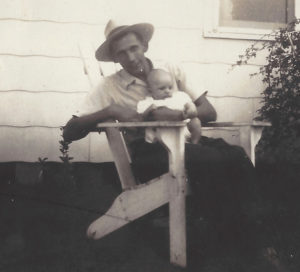
My dad was born 100 years ago on this day in 1918 in Appomattox, Virginia, near the McLean house where Lee surrendered to Grant a half century earlier.
He had a pretty rough childhood. His parents divorced when he was a baby and he grew up bouncing back and forth between them.
His mother caught tuberculosis when he was in grade school. After his death, we found a tin box in his bedroom with letters she sent him from the hospital, trying to put a bright face on her condition. She told him how much she missed him and promised they’d be together soon. She died when he was twelve.
He graduated from high school during the depression. There were no jobs in Appomattox, and severe asthma disqualified him from military service. The military installations in Virginia’s tidewater area were hiring in the run-up to World War II, so he moved to Yorktown and got a job in the Navy Mine Depot’s maintenance department.
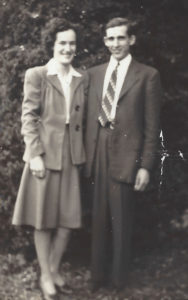 Mom worked there, too, and Dad fell for her. She was seventeen when they eloped, running across the state line to North Carolina, which didn’t require her parents’ consent to tie the knot.
Mom worked there, too, and Dad fell for her. She was seventeen when they eloped, running across the state line to North Carolina, which didn’t require her parents’ consent to tie the knot.
Mom telephoned her father (my Papaw) in the middle of the night and broke the news. At my parents’ sixtieth wedding anniversary celebration, I asked my uncle, her oldest brother, how that call went down. He said Papaw looked like he wanted to kill someone.
That someone was Dad, I guess, but I never saw any evidence of Papaw’s hard feelings. Dad’s tough childhood left him insecure and anxious, but Papaw always encouraged him. “You can do anything if you’ve got Willy on your side,” he used to say to Dad. “Willy” was will power.
With Willy on his side, Dad left his job at the Depot and opened his own Hudson car dealership, where he found his first great passion, selling cars. He sold so many Hudsons that the Hudson Company wanted to leverage his talent by moving him to Hagerstown, Maryland, to manage a much bigger dealership.
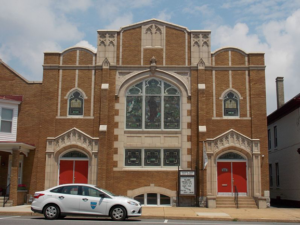
Mom agreed to the move only if Dad promised to go to church in Hagerstown. He had steadfastly refused to attend Sunday services up to that point, but he caved in to her demand and we piled everything we had in a moving van and headed up there.
At first, Dad groused every step of the way to the Church of the Lighted Window, but a few months into it, he stopped complaining. A year later, he became the church lay leader. Soon afterwards, he went on a weekend religious retreat where he found his second great passion, this one so all-consuming that it turned our lives upside down.
When Dad came home from the retreat, he dropped his suitcase on the floor, beamed at Mom, and announced, “Honey, I’m going to be a preacher!”
Shocked and not so pleased, Mom said, “But all I wanted you to do was go to church.”
The keynote speaker at the retreat was a Methodist bishop with Parkinson’s disease, who spoke about his life of service. At the end of his talk, the bishop raised his hand and called to the altar those who wanted to commit their lives to Christ. On his death bed fifty years after the event, Dad said he could still see the bishop’s pale palsied hand fluttering in the air like the broken wing of a white dove. That hand grabbed him by the heart and called him to preach the Word.
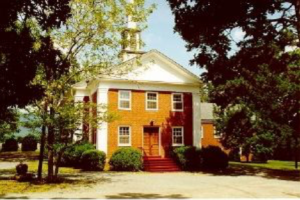
A car salesman in his mid-thirties with a wife and three sons, no education beyond high school, and no way to pay for college and seminary, he was an improbable candidate for the ministry. The only path to the pulpit open to him was a long hard slog through a seemingly endless swamp of correspondence school courses while he worked full-time selling cars.
He spent five years studying course materials he received in the mail, taking tests and writing essays, and sending them back to the course administrators for evaluation. In 1960, the Methodist Church finally accepted him provisionally as a “supply pastor.” That status entitled him to be considered for assignment to a church only after all the fully qualified ministers had been given a post.
In 1961, the Methodist hierarchy gave Dad his first appointment, a four-church charge known as the Albemarle Circuit, two churches with 100 members and two with less than 50, and we moved to White Hall, Virginia, a rural town at the foot of the Blue Ridge mountains.
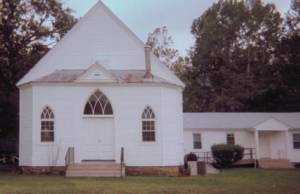
I thought Dad would almost certainly fail. He had no formal training in public speaking or counseling, and the workload was crushing.
The first Sunday we were there, he met with a young single mother who was suicidal because her husband had been killed in an accident. Dad moved her into the parsonage, and she lived with us for a week. She was in her sixties the last time I saw her.
Meningitis killed the infant of a young couple. He brought them through their grief, and they went on to have four more children.
A man in a position of trust molested a teenage boy, plunging him into chronic depression. Dad helped him heal his wounds and move on with his life.
These are the early stories. Hundreds more followed.
After attending night school at UVA and completing another barrage of correspondence courses, Dad was ordained as a full-fledged minister. He served six churches over a twenty-five year career. In his late sixties, he tried to retire, but it didn’t take. He volunteered to pastor a church that couldn’t afford a full-time minister and preached there for almost a decade. In his eighties, he asked for an appointment closer to his home. They gave him a little church in its death throes, its congregation down to about ten stalwarts. He revived it, building it up to 50 regular attendees.
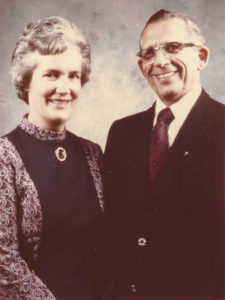 He had a stroke when he was 86. One month later, he returned to the little church’s pulpit, this time in a wheel chair, and Christian-soldiered on until old age broke him down.
He had a stroke when he was 86. One month later, he returned to the little church’s pulpit, this time in a wheel chair, and Christian-soldiered on until old age broke him down.
No longer able to preach and bed-ridden, he told us he was ready to go to heaven.
I sat by his bed, and we talked about old times. “How did you do it?” I asked him. “How did you overcome all the obstacles?”
He paused for a long time. “Determination,” he said. Papaw’s Willy, I thought. “And my Faith.”
He slept almost all the time his last few days. The hospice lady said he was preparing to die. Mom rolled her wheelchair up to his bed and took his hand. “It’s okay, Tommy. You can go on now.” I don’t know if he heard her, but he let go soon after that.
Four Methodist ministers preached at his funeral. We sang In the Garden, his favorite hymn. Its stanzas are about walking and talking with Jesus in a rose garden. One of the many Methodist preachers Dad had shepherded into the ministry ended the funeral service by saying that Dad had been walking and talking with Jesus those last days when he was asleep. “When they’d walked a long way up the road,” he said, “Jesus told Tommy, ‘You know, my place is closer than yours. Let’s just go on up there together.’”
If heaven is a place where your dreams are fulfilled, I know what my dad’s doing right now. There’s a little country church with sunlight coming through stained glass windows to paint rainbow colors on the pine pews. The sanctuary is full. Mom’s playing a hymn on the piano. When the singing’s done, she moves from the
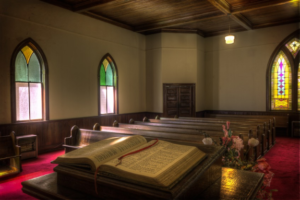
piano bench to the front pew and sits beside me and my brothers, all dressed in our Sunday best.
Dad stands and takes his place at the pulpit, back straight, voice strong.
Rest in Peace, Dad.



November 12, 2018 @ 9:22 am
Hello Ken. We are distantly related. Hank Oder was my father-in-law, and I am married to his son David. Your father baptized our son Joseph. Joe is a college sophomore, a time of life simultaneously thrilling and daunting. I will introduce him to “Old Willy” today. Thank you for your wonderful story!
November 18, 2018 @ 8:54 am
Great to hear from you, Leila. I’m sorry for the late reply. The California fires knocked out our internet connection and it wasn’t restored until today. I didn’t know Dad baptized Joseph. I know he and Uncle Hank reconnected in their later years and forged a bond. I called Uncle Hank after Dad passed on to tell him about it. He gave me some good stories that cheered me up. Thanks for reading my blog and keep in touch.
October 1, 2018 @ 6:28 pm
Thanks for your wonderful family story, Ken.
October 2, 2018 @ 8:12 am
Thanks, Linda! Hope you and Jack are doing well.
September 29, 2018 @ 6:40 pm
A wonderful tribute to a special gentleman who I treasure to this day, as well as your Mom. Rev. Oder showed and taught me that you did not have to be perfect to reach Heaven and renewed my faith in church. I only go today because of him. He also was very special to my sister and I when we suddenly lost our mother who was only 49. Miss Joy and him were such a blessing. Loved them deeply.
September 30, 2018 @ 7:47 am
Thanks, Renee, for your comments. Mom and Dad touched a lot of lives and helped many people. I’m glad you and your sister were among them!
September 29, 2018 @ 6:23 am
This is beautiful. I lived across the street while they lived in Reedville. Your family is wonderful. Thank you so much for this beautiful piece.
September 29, 2018 @ 7:34 am
Thank you, Marilou. They loved Reedville and all their friends there. I did, too. It is a beautiful town.
September 28, 2018 @ 9:56 pm
I loved reading about your preacher dad who must have been a blessing to so many. You are a great writer; this made me cry though, missing and loving my wonderful father who died when I was just 30.
September 29, 2018 @ 7:37 am
Thank you, Martha. I cried when I wrote it, but it was helpful to go through all the memories. I’m sorry you lost your dad so young in life, but I bet you have great memories, too. And that’s some consolation.
September 28, 2018 @ 7:41 pm
What a beautiful tribute to your Father, and what a testimony of how one’s life can be changed when they have an encounter with God. Blessings to you and your family.
September 29, 2018 @ 7:39 am
Thank you, June! He was a transformational figure in so many lives
September 28, 2018 @ 5:50 pm
I love this, Ken. It reminds me of home and In The Garden was a family favorite at my house across from Crozet Baptist Church. Thanks for these memories of your Dad and Happy 100th to the Preacher.
September 28, 2018 @ 6:52 pm
Thanks, Susan! Lots of great memories in writing this one.
September 28, 2018 @ 5:02 pm
Great story as usual. It’s amazing what folks can do with “Willy”!
September 28, 2018 @ 6:53 pm
Thanks, Randy! Willy is a big ally for a lot of us.
September 28, 2018 @ 3:43 pm
I am sorry to here about your dad. He is in a better place with no pain.
My first church was the Methodist Church and I was a lay speaker for a number of years. I enjoyed it. Very nervous the first time but after that did much better. I try to do what the Lord wants and not what I want and I also trust in Him. It has made my life complete, very complete. Praise the Lord. Johnny Atkins
September 28, 2018 @ 6:55 pm
Thanks, Johnny! My dad was nervous the first time he served as an usher. Looking back on it now, it’s hard to believe considering where his faith took him. Thanks for following my blog.
September 28, 2018 @ 3:25 pm
Great tribute Ken. A special Father.
September 28, 2018 @ 6:56 pm
Thanks, Dan! He was special.
September 28, 2018 @ 3:04 pm
Kenny,What a great story about your Dad and his journey to Heaven.He was a strong willed Man who never gave up and received his reward and now walks the streets of gold with many of his followers.Thanks for sending this to me. Larry
September 28, 2018 @ 6:57 pm
Thanks for following my blog, Larry! He was an exceptional man. I enjoyed writing this one.
September 28, 2018 @ 2:34 pm
Well done, Ken
September 28, 2018 @ 6:58 pm
Thanks, Sharon!
September 28, 2018 @ 2:27 pm
What a blessing to have had both parents for as long as you did. That may not be much help, but know it comes from the heart. My parents died 15 months apart 40 years ago (next week I will be 62) and never got to see me anything more than flunk out of college…I hope all parents on earth and heaven know and love us.
[BTW- I went back to school, got a BSW,a MTS,M.Div and was ordained in ‘89 in the UCC. During my time as an active minister, I got a PTS and was a successful interim until my retirement]
September 28, 2018 @ 7:00 pm
What a great life story you have lived, Andrea. I’m sorry you lost your parents when you were so young, but I’m sure they’re proud of all you accomplished.
September 28, 2018 @ 12:18 pm
Lovely tribute, Ken. My grandmother was Baptist, but In the Garden was her favorite hymn and played at her funeral, too. So if she hears the singing in your father’s heavenly country church, it wouldn’t surprise me, if she slipped in to join the chorus.
September 28, 2018 @ 7:01 pm
Thanks, Carla! Such a beautiful thought about your grandmother. Thanks so much.
September 28, 2018 @ 12:03 pm
Just beautiful, Ken…
Thank you!
September 28, 2018 @ 7:02 pm
Thanks, Eric!
September 28, 2018 @ 12:00 pm
Remembering his time at Mount Moriah. Did not realize how close in age he was to my parents. Dad–August 1917; Mom–February 1918”
Nice memories Ken. Thank you for sharing,
September 28, 2018 @ 7:03 pm
I have some great memories of Mount Moriah, Bettie. A beautiful sanctuary and great congregation. I miss it still.
September 28, 2018 @ 11:56 am
Beautifully written Ken.…..
How blessed you were to have a dad like that. ?
September 28, 2018 @ 7:03 pm
Thanks, Cathy. So true.
September 28, 2018 @ 11:50 am
And I am going to sing in your sweet Mama’s choir!! We visited them several times before your Dad died and after..to see our Mom!! Sweet people!!!
September 28, 2018 @ 7:05 pm
Great to hear from you Betty Jo! Mom spoke of your visits to Reedville and really appreciated the time you spent with her. Thanks for following my blog.
September 28, 2018 @ 11:42 am
Once again, a captivating story told with grace and dignity. The apple did not fall far from the tree.
September 28, 2018 @ 7:06 pm
Thanks, Don! Hard to live up to that compliment, though.
September 28, 2018 @ 11:38 am
That was beautiful Ken. Thanks for sharing.
September 28, 2018 @ 7:07 pm
Thanks, Wes!
September 28, 2018 @ 11:18 am
Ken, if there is a heaven, your mom and dad are smiling proudly at this wonderful gift you have given us all with this blog. Thanks for being so vulnerable and sharing this story with us. Your folks are also smiling knowing they gave us three really great people in their sons.
September 28, 2018 @ 7:09 pm
Thanks, Lucian! I learned a lot about my Dad and how I felt about him writing this. It was a helpful, fulfilling experience.
September 28, 2018 @ 11:12 am
I love to read all of your personal stories but this was by far the most moving and the most beautiful!
September 28, 2018 @ 7:10 pm
Thanks so much, Karen!
September 28, 2018 @ 11:11 am
What a lovely story of a life well lived ??
September 28, 2018 @ 7:10 pm
Thanks, Rebecca!
September 28, 2018 @ 11:09 am
Glad you got to White Hall. I remember your place “out there.” The back way from West Leigh was a very pleasant drive in the MGB.
September 28, 2018 @ 7:11 pm
It was a beautiful place, and still is. That drive was spectacular, I agree.